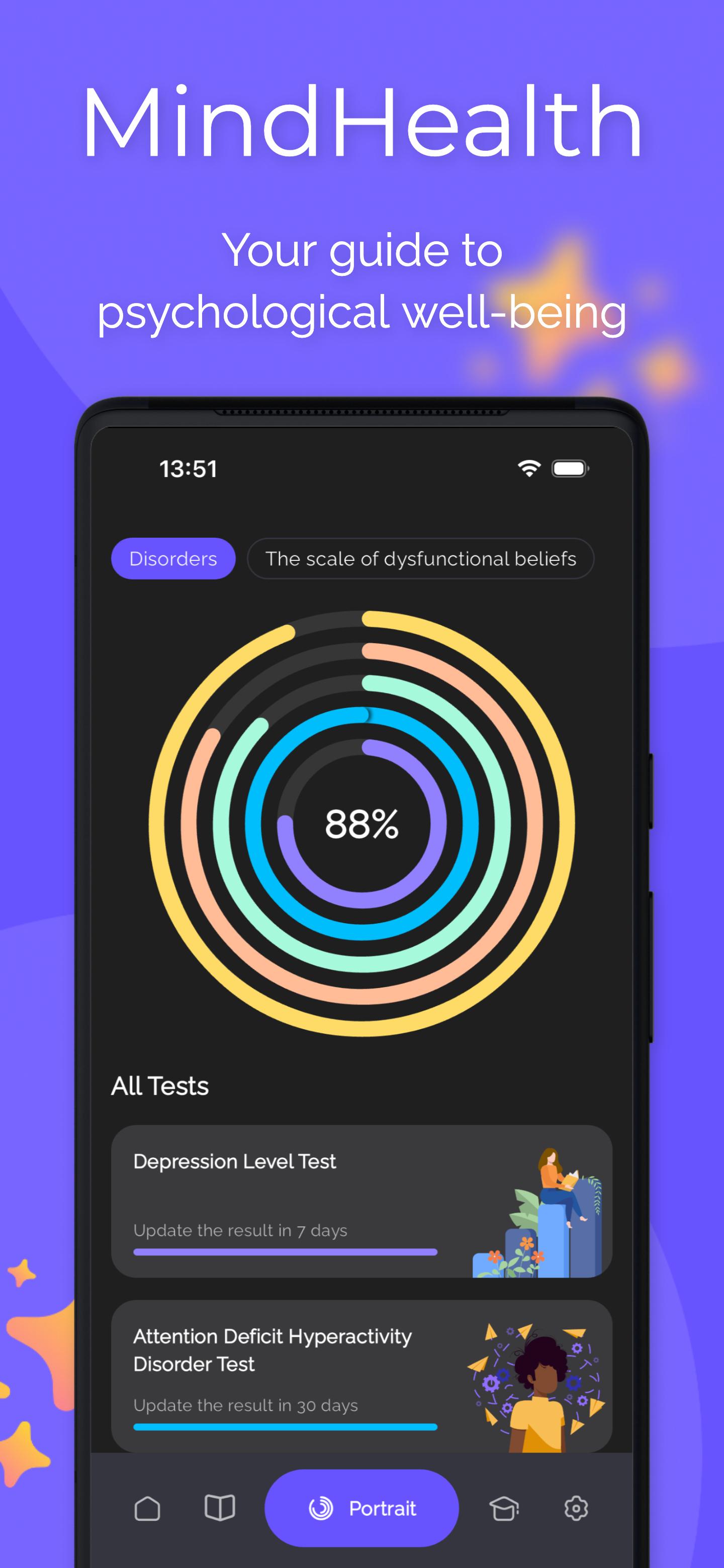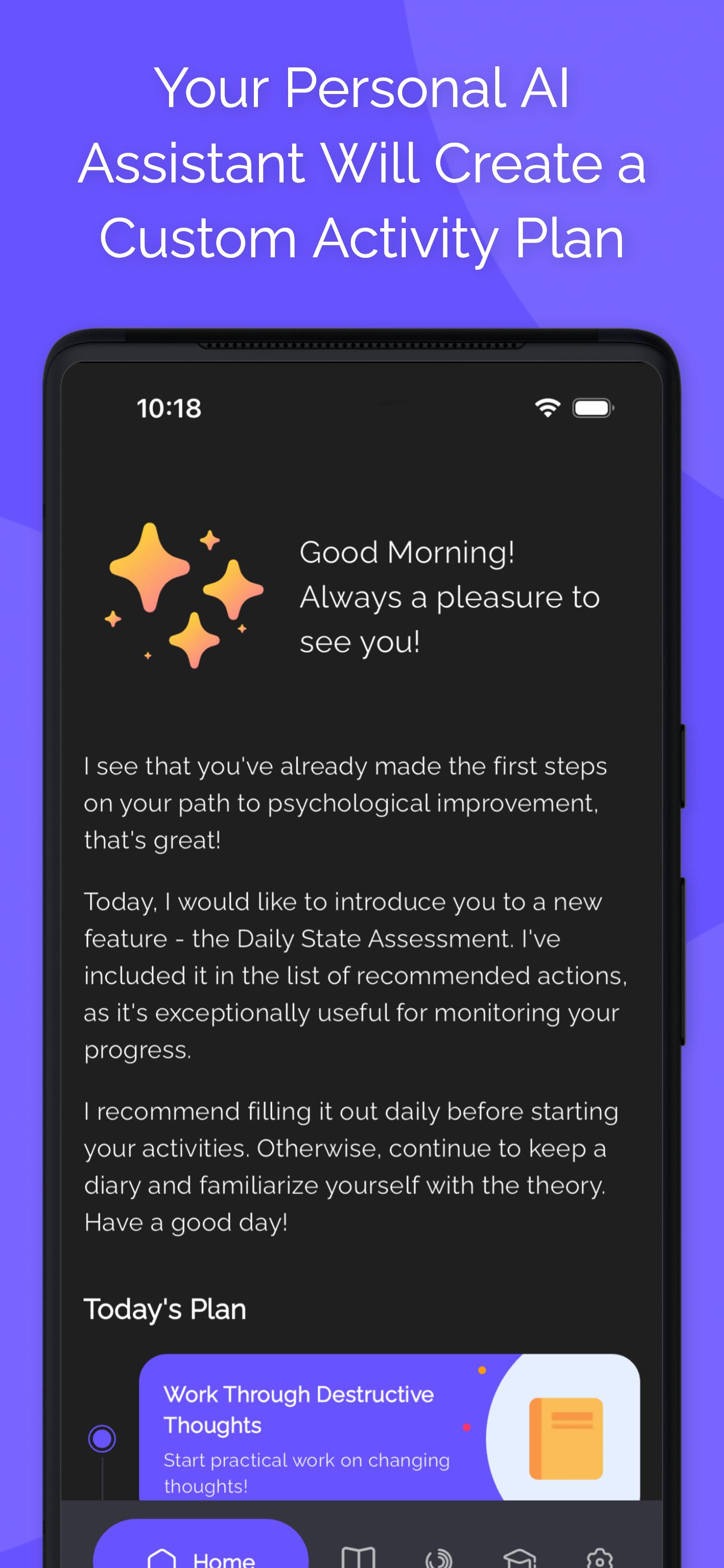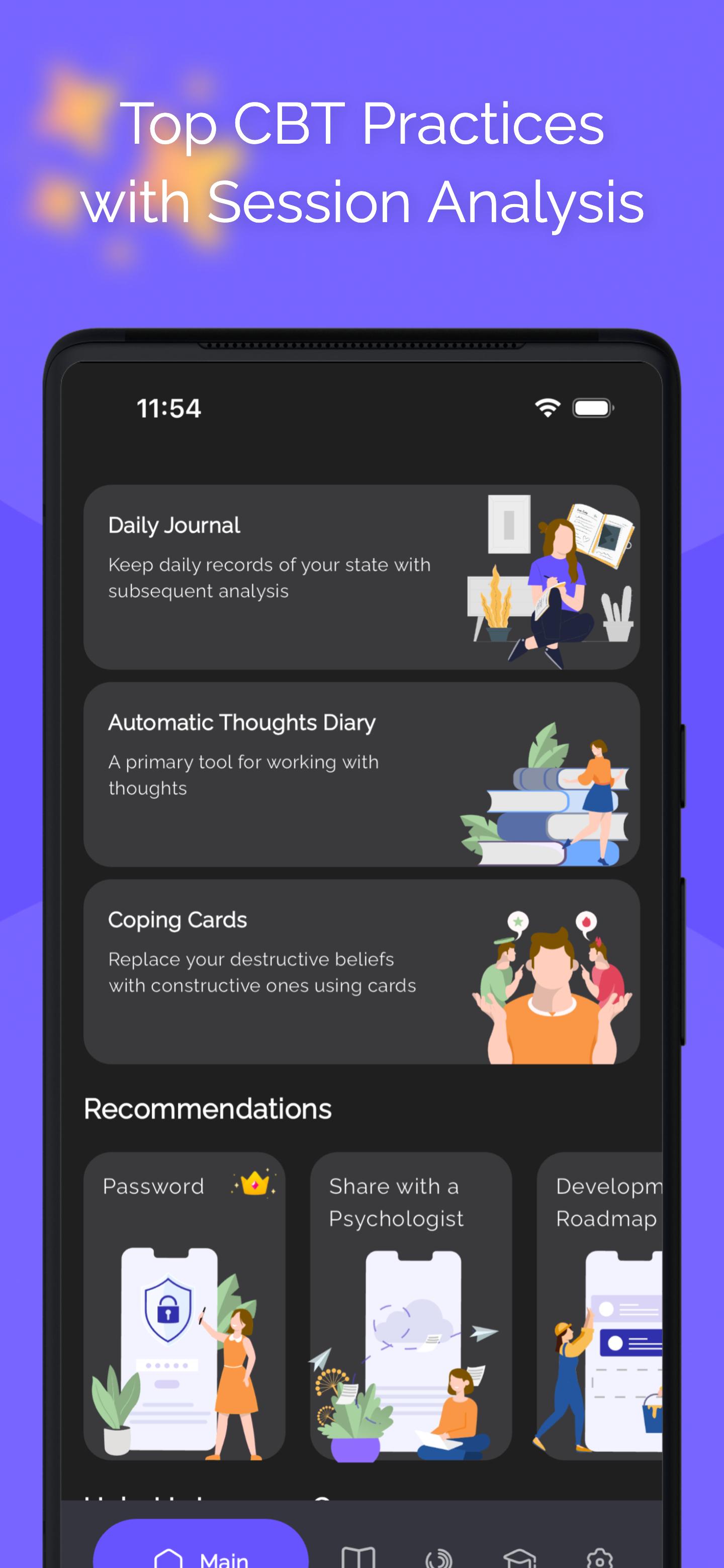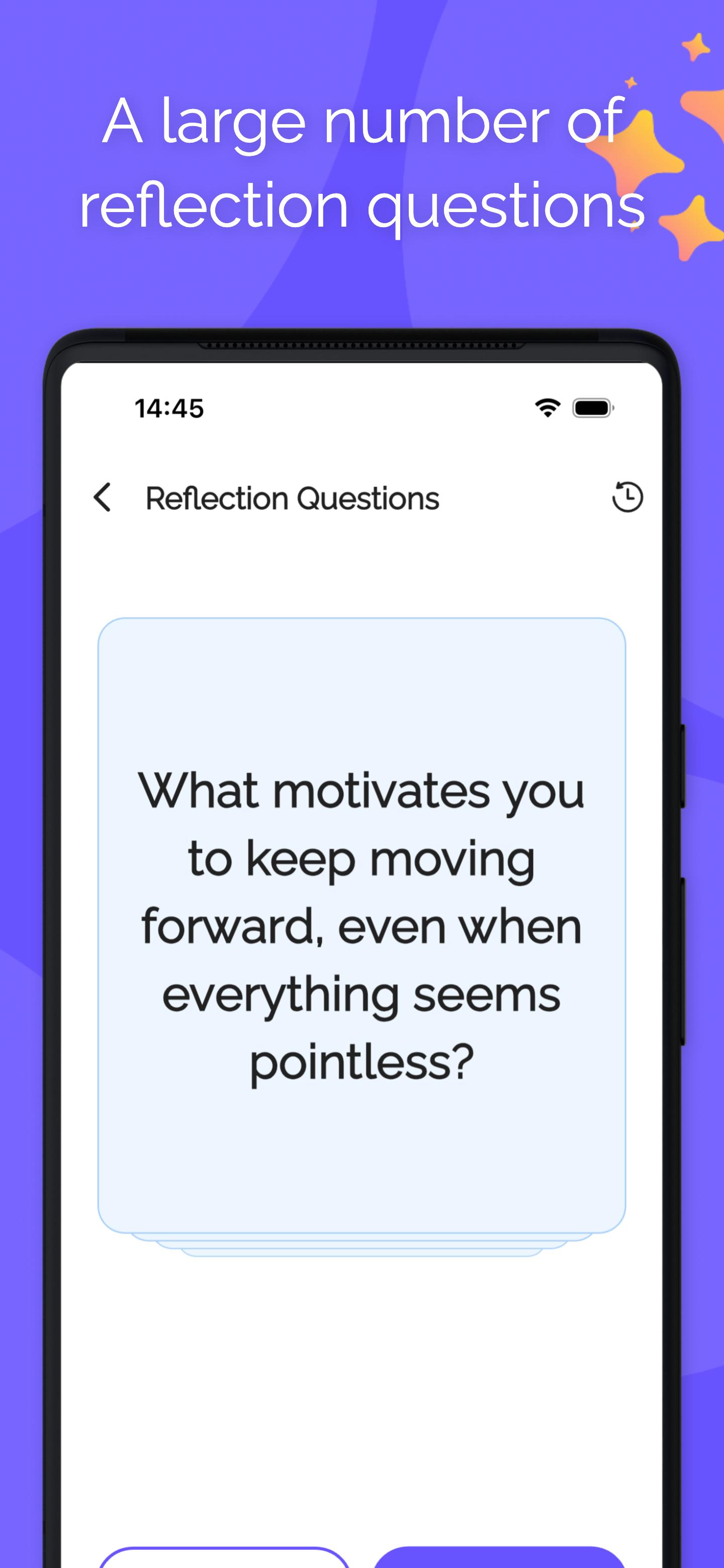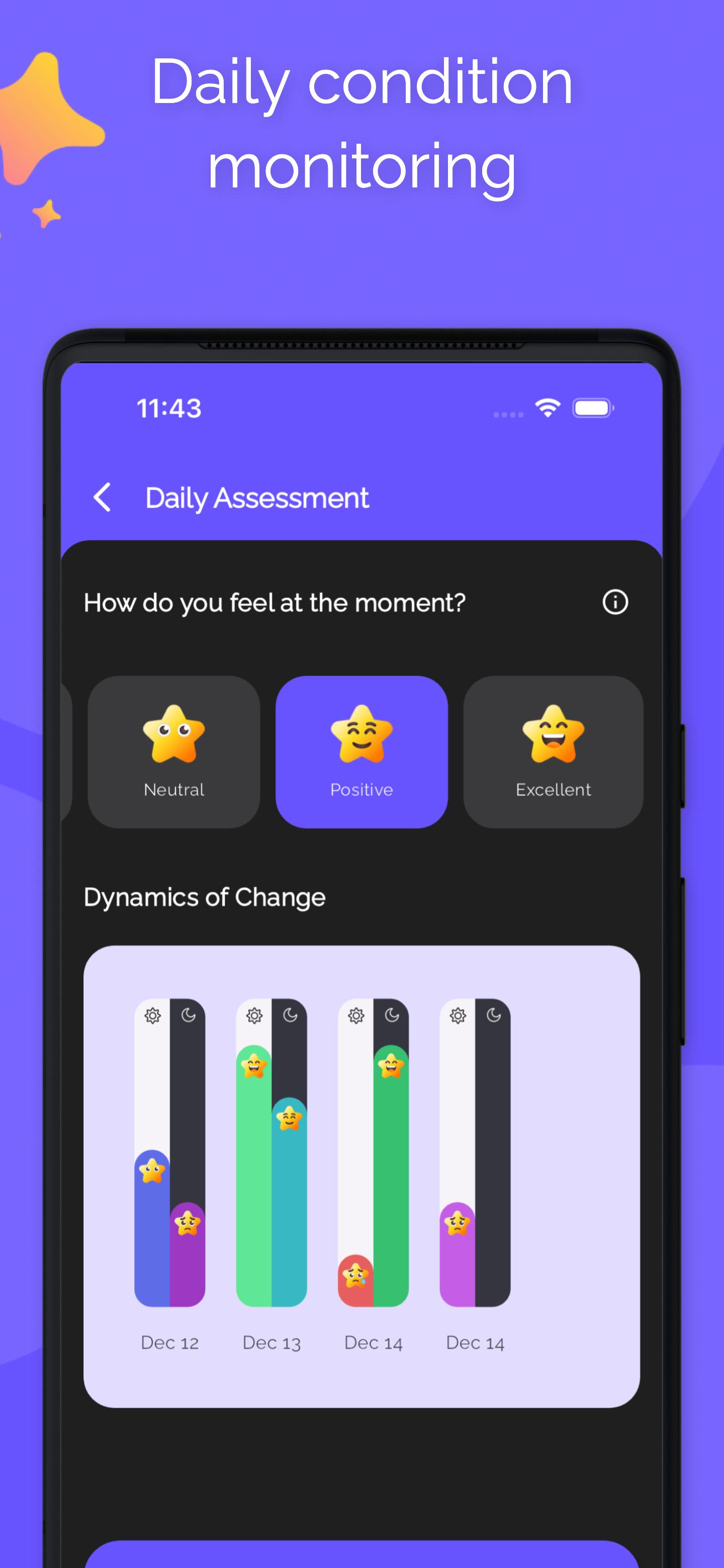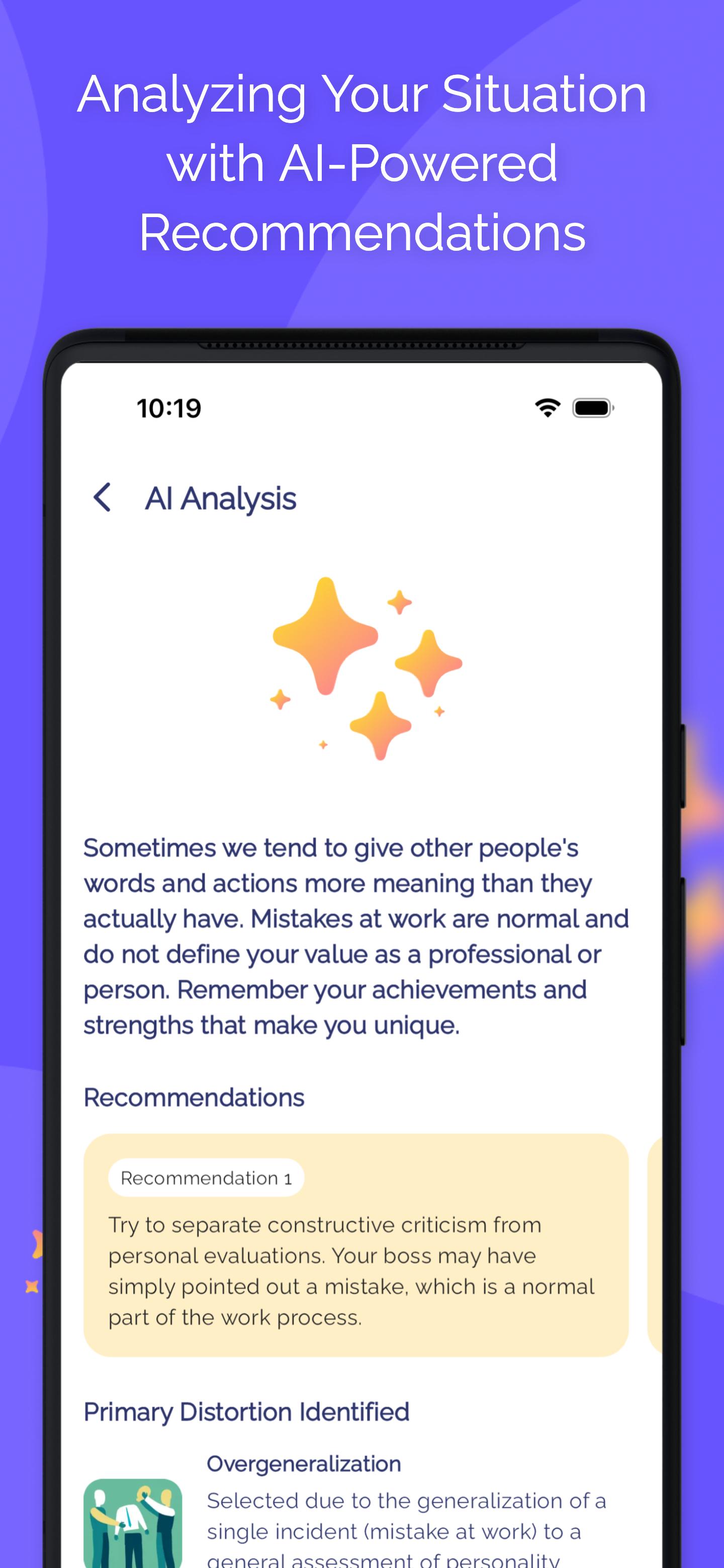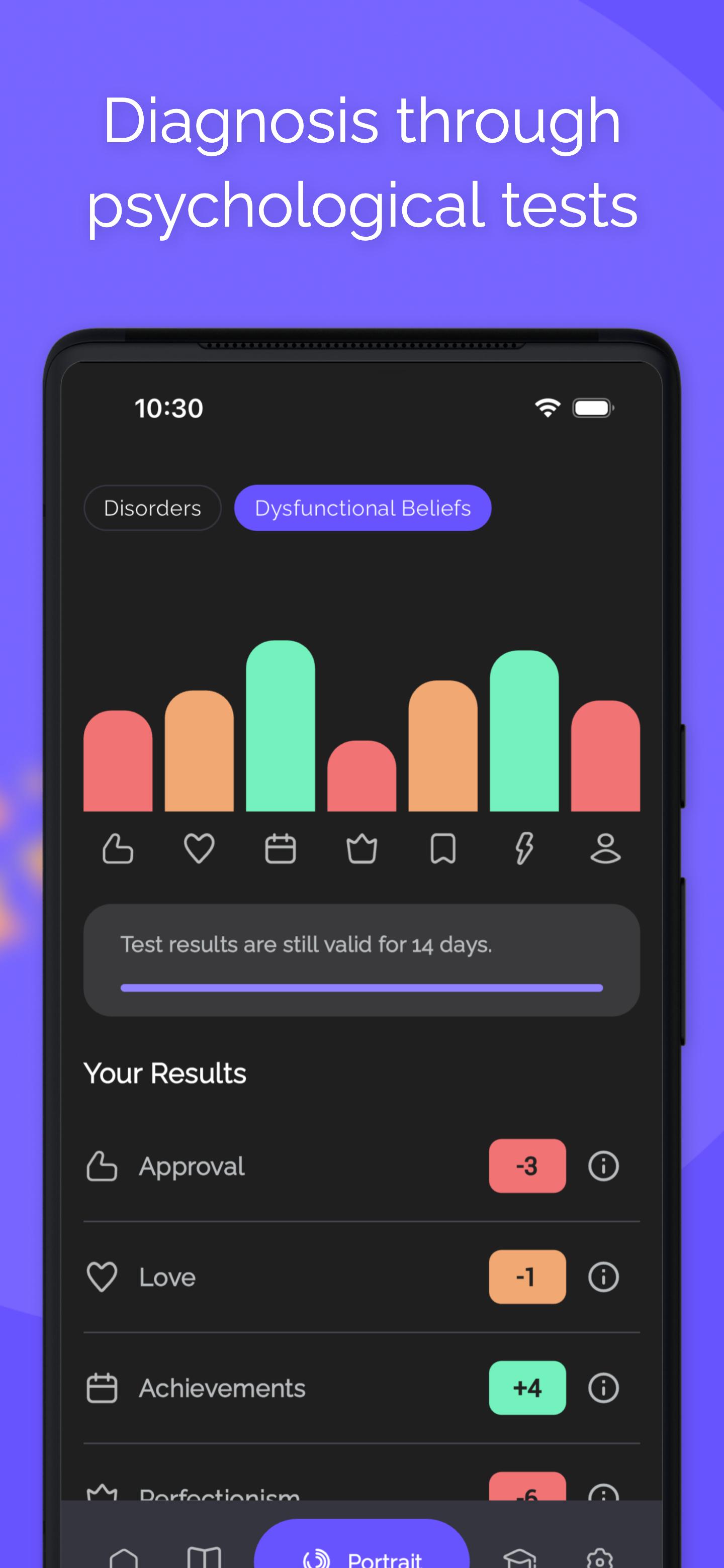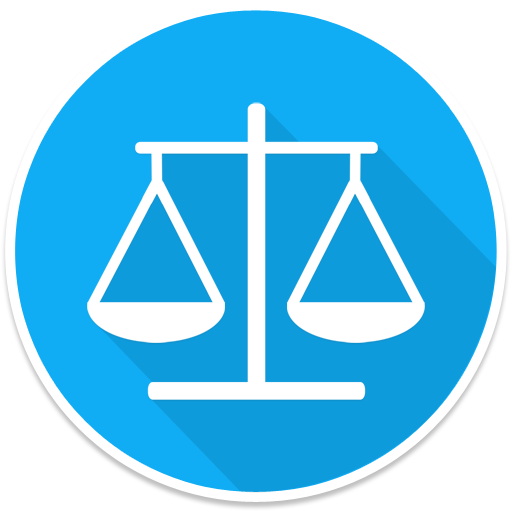Main CBT techniques, psychological tests - self-help for depression, anxiety
Our Cognitive Behavioral Therapy (CBT) App — is your personal psychotherapist in a mobile format, designed for everyone aiming to improve their mental health and psychological well-being.
🔍 Psychological Tests
Currently, diagnostic tests are available for various psychological issues such as depression, eating disorders, neurosis, and ADHD. After completing these tests, you can create your own psychological profile and monitor its progress over time.
Our psychological tests are developed considering modern methods in psychiatry and psychotherapy. After taking the tests for depression and anxiety, you will receive feedback and recommendations from qualified psychotherapists. These tests are your first step towards anti-depression and enhancing your mental health.
📓 Popular CBT Techniques
- CBT thought diary (cbt journal) — a primary tool of cognitive behavioral therapy. The diary consists of 9 steps, helping you identify and work through your cognitive distortions.
- Daily Diary — record your thoughts freely with analysis and recommendations from AI.
- Coping Cards — note down your destructive beliefs in coping cards format and work through them conveniently.
📘 Studying Psychology
We have developed a series of interactive courses on topics such as depression and mental health. Thanks to our educational materials, you will understand the basic principles of CBT and learn how to work properly with a thoughts diary.
Learn what terms like: panic attack, emotional intelligence, positive thinking, burnout, adhd, eating disorder (ED), and others mean.
🤖 AI Psychologist Assistant
Throughout your journey, your personal AI psychologist will accompany you. It will suggest the best exercises based on your condition and help rephrase negative thoughts.
📊 Mood Tracker
Twice a day, you can assess your mood and note predominant emotions. This way, you can track changes in your well-being and maintain a mood diary.
The mood tracker is an incredibly effective tool for anxiety. Using it in conjunction with psychological tests and a mood diary will help to track the dynamics of the condition and improve mental health.
Depression, neurosis, anxiety, burnout, panic attacks — unfortunately, these issues are familiar to everyone. That is why we started developing our product. Our goal is to create the best self-help app on the market.
We position the app as "your personal psychologist" for self-help. Our AI assistant will support you on the challenging path to psychological health.
In addition, you will find affirmations and reflective questions in the app. You can share your experiences with others.
Our methods are based on proven principles of cognitive behavioral therapy, one of the most effective psychotherapy methods.
With our app, everyone can become their own psychotherapist, gain self-confidence, improve mental and psychological health, and overcome anxiety disorders and depression.
We have developed the best CBT app on the market, in it you can work through your automatic thoughts, get rid of anxiety and depression. This app can become your personal CBT coach.
Self-help and self-reflection are an important part of working with a psychotherapist. It is clear that psychological help is needed on a regular basis.
Psychology can be very costly financially. This is why our project (Mental Health) focuses on self-work with thoughts and cognitive distortions.
What's New in the Latest Version 4.2.0
Last updated on Jun 21, 2024
Thank you for using MindHealth! Every release makes our tool better! Take psychological tests, work on destructive beliefs, read psychology articles. This will help you alleviate symptoms of depression and neurosis. Enjoy using it!
MindHealth, as a hypothetical game concept, encompasses a wide range of potential gameplay mechanics and thematic elements centered around mental well-being. Envision a game where players actively engage in activities designed to promote and maintain mental health, translating real-world practices into a virtual environment.The core gameplay of MindHealth could revolve around several key areas. One crucial aspect is mindfulness, where players participate in guided meditation exercises, breathing techniques, and sensory awareness activities. These interactive experiences could involve calming visuals, soothing soundscapes, and haptic feedback, immersing players in a tranquil environment designed to reduce stress and anxiety.
Another core element of MindHealth could focus on emotional regulation. Players might encounter scenarios that present emotional challenges, requiring them to identify and manage their feelings effectively. The game could offer tools and techniques, such as cognitive reframing and emotional labeling, to help players navigate these situations and develop healthy coping mechanisms.
Building positive habits is another potential gameplay focus. MindHealth could incorporate features that encourage players to set realistic goals, track their progress, and develop healthy routines related to sleep, exercise, and nutrition. Gamified elements, such as rewards and achievements, could further motivate players to maintain these positive habits over time.
Social connection plays a vital role in mental well-being, and MindHealth could incorporate social features that foster a sense of community and support. Players could connect with friends and family, participate in group activities, and share their experiences within a safe and supportive virtual environment. This could involve joining online support groups, engaging in collaborative challenges, or simply connecting with others who share similar goals.
Cognitive skills training could also be integrated into MindHealth. Players might engage in puzzles, memory games, and other activities designed to enhance cognitive function and improve mental acuity. These exercises could be tailored to individual needs and progressively challenge players to develop their cognitive abilities.
MindHealth could also incorporate personalized learning experiences. The game could assess player progress and tailor challenges and activities to individual needs and preferences. This personalized approach could ensure that players are continually challenged and engaged while receiving support tailored to their specific mental health journey.
The game's narrative could unfold through a variety of formats. Players might embark on a guided journey through different landscapes representing various aspects of mental well-being. Alternatively, the game could present a series of interactive scenarios that challenge players to apply learned skills in realistic situations.
Visual aesthetics would play a crucial role in creating a calming and immersive experience. MindHealth could feature serene landscapes, vibrant colors, and soothing animations to create a visually appealing environment conducive to relaxation and focus. The soundtrack could further enhance the experience, incorporating calming melodies, nature sounds, and ambient music to promote a sense of tranquility.
Accessibility is a paramount consideration for a game focused on mental health. MindHealth should be designed to be accessible to players of all ages and abilities, with customizable difficulty levels and adjustable gameplay options. The game should also be available on a variety of platforms to ensure accessibility to a wide audience.
MindHealth has the potential to be a valuable tool for promoting mental well-being. By combining engaging gameplay with evidence-based practices, MindHealth could empower players to take control of their mental health and develop healthy coping mechanisms. The game's focus on mindfulness, emotional regulation, positive habits, social connection, and cognitive skills training could provide a comprehensive approach to mental wellness. Ultimately, MindHealth could serve as a valuable resource for individuals seeking to improve their mental health and build a more resilient and fulfilling life. The game's potential to create a positive impact on players' lives makes it a compelling concept worthy of further exploration and development. By seamlessly integrating real-world practices into an engaging virtual experience, MindHealth could revolutionize the way we approach mental well-being and empower individuals to take proactive steps towards a healthier and happier life.
Main CBT techniques, psychological tests - self-help for depression, anxiety
Our Cognitive Behavioral Therapy (CBT) App — is your personal psychotherapist in a mobile format, designed for everyone aiming to improve their mental health and psychological well-being.
🔍 Psychological Tests
Currently, diagnostic tests are available for various psychological issues such as depression, eating disorders, neurosis, and ADHD. After completing these tests, you can create your own psychological profile and monitor its progress over time.
Our psychological tests are developed considering modern methods in psychiatry and psychotherapy. After taking the tests for depression and anxiety, you will receive feedback and recommendations from qualified psychotherapists. These tests are your first step towards anti-depression and enhancing your mental health.
📓 Popular CBT Techniques
- CBT thought diary (cbt journal) — a primary tool of cognitive behavioral therapy. The diary consists of 9 steps, helping you identify and work through your cognitive distortions.
- Daily Diary — record your thoughts freely with analysis and recommendations from AI.
- Coping Cards — note down your destructive beliefs in coping cards format and work through them conveniently.
📘 Studying Psychology
We have developed a series of interactive courses on topics such as depression and mental health. Thanks to our educational materials, you will understand the basic principles of CBT and learn how to work properly with a thoughts diary.
Learn what terms like: panic attack, emotional intelligence, positive thinking, burnout, adhd, eating disorder (ED), and others mean.
🤖 AI Psychologist Assistant
Throughout your journey, your personal AI psychologist will accompany you. It will suggest the best exercises based on your condition and help rephrase negative thoughts.
📊 Mood Tracker
Twice a day, you can assess your mood and note predominant emotions. This way, you can track changes in your well-being and maintain a mood diary.
The mood tracker is an incredibly effective tool for anxiety. Using it in conjunction with psychological tests and a mood diary will help to track the dynamics of the condition and improve mental health.
Depression, neurosis, anxiety, burnout, panic attacks — unfortunately, these issues are familiar to everyone. That is why we started developing our product. Our goal is to create the best self-help app on the market.
We position the app as "your personal psychologist" for self-help. Our AI assistant will support you on the challenging path to psychological health.
In addition, you will find affirmations and reflective questions in the app. You can share your experiences with others.
Our methods are based on proven principles of cognitive behavioral therapy, one of the most effective psychotherapy methods.
With our app, everyone can become their own psychotherapist, gain self-confidence, improve mental and psychological health, and overcome anxiety disorders and depression.
We have developed the best CBT app on the market, in it you can work through your automatic thoughts, get rid of anxiety and depression. This app can become your personal CBT coach.
Self-help and self-reflection are an important part of working with a psychotherapist. It is clear that psychological help is needed on a regular basis.
Psychology can be very costly financially. This is why our project (Mental Health) focuses on self-work with thoughts and cognitive distortions.
What's New in the Latest Version 4.2.0
Last updated on Jun 21, 2024
Thank you for using MindHealth! Every release makes our tool better! Take psychological tests, work on destructive beliefs, read psychology articles. This will help you alleviate symptoms of depression and neurosis. Enjoy using it!
MindHealth, as a hypothetical game concept, encompasses a wide range of potential gameplay mechanics and thematic elements centered around mental well-being. Envision a game where players actively engage in activities designed to promote and maintain mental health, translating real-world practices into a virtual environment.The core gameplay of MindHealth could revolve around several key areas. One crucial aspect is mindfulness, where players participate in guided meditation exercises, breathing techniques, and sensory awareness activities. These interactive experiences could involve calming visuals, soothing soundscapes, and haptic feedback, immersing players in a tranquil environment designed to reduce stress and anxiety.
Another core element of MindHealth could focus on emotional regulation. Players might encounter scenarios that present emotional challenges, requiring them to identify and manage their feelings effectively. The game could offer tools and techniques, such as cognitive reframing and emotional labeling, to help players navigate these situations and develop healthy coping mechanisms.
Building positive habits is another potential gameplay focus. MindHealth could incorporate features that encourage players to set realistic goals, track their progress, and develop healthy routines related to sleep, exercise, and nutrition. Gamified elements, such as rewards and achievements, could further motivate players to maintain these positive habits over time.
Social connection plays a vital role in mental well-being, and MindHealth could incorporate social features that foster a sense of community and support. Players could connect with friends and family, participate in group activities, and share their experiences within a safe and supportive virtual environment. This could involve joining online support groups, engaging in collaborative challenges, or simply connecting with others who share similar goals.
Cognitive skills training could also be integrated into MindHealth. Players might engage in puzzles, memory games, and other activities designed to enhance cognitive function and improve mental acuity. These exercises could be tailored to individual needs and progressively challenge players to develop their cognitive abilities.
MindHealth could also incorporate personalized learning experiences. The game could assess player progress and tailor challenges and activities to individual needs and preferences. This personalized approach could ensure that players are continually challenged and engaged while receiving support tailored to their specific mental health journey.
The game's narrative could unfold through a variety of formats. Players might embark on a guided journey through different landscapes representing various aspects of mental well-being. Alternatively, the game could present a series of interactive scenarios that challenge players to apply learned skills in realistic situations.
Visual aesthetics would play a crucial role in creating a calming and immersive experience. MindHealth could feature serene landscapes, vibrant colors, and soothing animations to create a visually appealing environment conducive to relaxation and focus. The soundtrack could further enhance the experience, incorporating calming melodies, nature sounds, and ambient music to promote a sense of tranquility.
Accessibility is a paramount consideration for a game focused on mental health. MindHealth should be designed to be accessible to players of all ages and abilities, with customizable difficulty levels and adjustable gameplay options. The game should also be available on a variety of platforms to ensure accessibility to a wide audience.
MindHealth has the potential to be a valuable tool for promoting mental well-being. By combining engaging gameplay with evidence-based practices, MindHealth could empower players to take control of their mental health and develop healthy coping mechanisms. The game's focus on mindfulness, emotional regulation, positive habits, social connection, and cognitive skills training could provide a comprehensive approach to mental wellness. Ultimately, MindHealth could serve as a valuable resource for individuals seeking to improve their mental health and build a more resilient and fulfilling life. The game's potential to create a positive impact on players' lives makes it a compelling concept worthy of further exploration and development. By seamlessly integrating real-world practices into an engaging virtual experience, MindHealth could revolutionize the way we approach mental well-being and empower individuals to take proactive steps towards a healthier and happier life.



